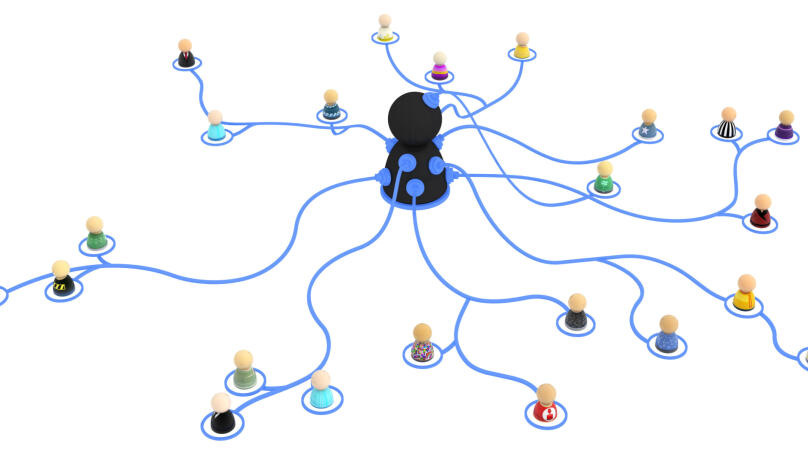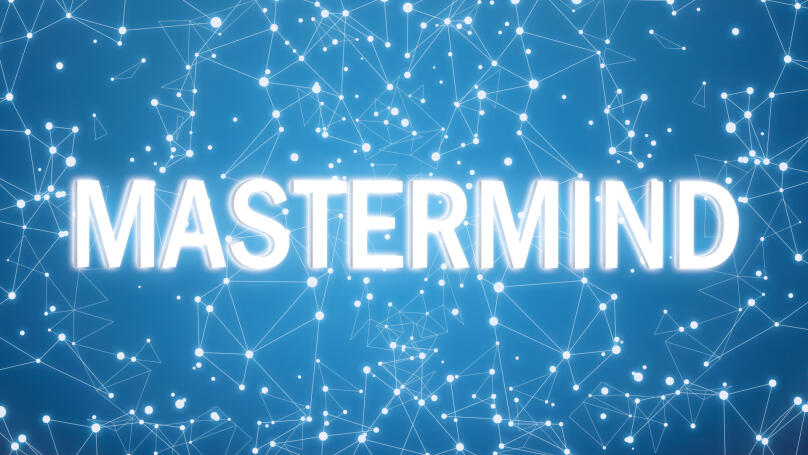Mastermind Group

What is a Mastermind Group?
A Mastermind Group is a small group united by a commitment to growth, development, and well-being. The definition of "the Mastermind Group" is a group of people who inspire each other. A Mastermind group can meet both online and offline but always under the supervision of a mastermind, i.e., a primary facilitator who oversees the conversation during such meetings.
In a mastermind, participants discuss their goals, share problems encountered along the way, give each other advice on how to solve them, and network, thus creating a community of like-minded professionals. Additionally, the mastermind often acts as a tool for tracking progress, as group communication involves being accountable and discussing one's achievements over a limited period.
The concept of "Mastermind Groups became popular with the book "Think and Get Rich," by Napoleon Hill. In his understanding, a "Mastermind Group" is a friendly association where each participant encourages others to follow a plan and achieve their goals. However, all participants should have similar visions and ideas, such as dreaming of moving to Europe or working in business. Standard mastermind meetings consist of the following discussion stages:
-
Retrospective. Participants talk briefly about the most striking episode or victory that has happened to them since the last meeting.
-
Reporting. Participants honestly acknowledge whether they have achieved the goals set in the last session, are on track with their plan, or are falling behind.
-
Perspective. Participants set new goals, priorities, and targets for the next term, plan for progress and identify any challenges they might face.
-
Actions. From the participants' perspective, they plan concrete actions and choose how to make the intended progress for the next session.
There are "Business Mastermind Groups," "Women's Mastermind Groups," "Marketing Groups," "Educational Groups," "Youth Groups," and so on. Whatever the type, usually, one mastermind meeting is held at least once every thirty days and lasts no more than ninety minutes.
The Rules of the Mastermind Group

So, no matter what the reason for which you all gathered in mastermind group (training together, career development, personal growth), your group should be based on three rules to bring real benefit to each of the participants:
Rule #1. All mastermind participants have similar experiences. If your group comprises students who have just graduated and experts with thirty years of experience, such a mastermind group will not bring equal success to all participants. Finding balance in the discussion process and building a common plan will be difficult. It is, therefore, important that all participants are, plus or minus, on the same level of experience, professionalism, and education as each other.
Rule #2. Participants have personal sympathy for each other. Can you see yourself as friends with participants in a mastermind, spending time together outside work? If not, the relationships within the group will not work out; after all, the primary purpose of a mastermind group is to inspire, support, and guide. It is why all participants must share common interests, hobbies, and mutual loyalty.
Rule #3. Participants are NOT competitors. Otherwise, you won't be able to give participants effective feedback and valuable advice, and you won't be able to trust their advice and experience. That's why the similarity of participants to each other should also be limited. If, for example, they are all business owners, the participating companies should be from different niches, not the same.
The Benefits of a Mastermind Group
So-called "Mastermind Groups" have a myriad of benefits, but the main ones include:
-
Free access to experts' experience and knowledge and the collective mind - sooner or later, everyone faces difficulties we cannot solve alone. At such times, we all want to have an advisor nearby with whom we can talk and discuss options. A "Mastermind Group" is a collection of trusted and reliable advisers. Finding a way out of any situation together is much easier than going alone.
-
Stricter tracking of progress. It is easy to put things off and forget about your goals when you are only accountable to yourself. In a mastermind, you must report to the whole group, and if you fall behind, you must explain why you didn't do anything as planned. Such meetings help to keep yourself in check and keep you motivated.
-
A Network of Business and Trusted Contacts. A mastermind is like networking; you communicate exclusively on business and professional topics, share experiences, and even run joint projects later. These connections can be useful to you in the future.
-
Fast and Steady Growth. As a result of all the benefits listed above, you will build a successful career or pursue your dream much more quickly if you work on yourself and your skills within the mastermind.
What You Need to Join a Mastermind Group?

Anyone can join a mastermind group, regardless of education, income, status, profession, etc. The critical thing is to find a "Mastermind Group that is the best fit for you. However, before looking for it, you should ensure you are ready for this collaborative development and work on yourself. To do this, answer the following questions:
-
"Am I disciplined enough right now to be part of a unified group and not let it down?" After all, if you are constantly falling behind your plan, not sharing your progress, and not taking steps towards your stated goals, you risk simply "falling out" of your mastermind life. At the very least, you will get asked why you are here, if not at all, asked to leave and not take up other participants' time.
-
"Am I ready for honest and mutual cooperation?" Mastermind is no place for selfishness. Here you should not only receive advice and help but also give it. You will also need a positive attitude, communication skills, and emotional intelligence to build strong, friendly relationships with other participants. Also, are you willing to commit time and your internal resources to regular meetings and communication?
-
"Do I have a definite goal?" Before you join an inspirational group, you need to find one. The goal can be career-related, educational, personal, health-related, beauty-related, etc. Nevertheless, it's your goal that determines which group you want. After all, when dreaming of moving to another country, it isn't smart to join those who have just moved to your country and are trying to get a foothold here.
How to Find a Mastermind Group

To find and join a "Mastermind Group," use the following methods:
- Speak to Your Environment.
Current or former colleagues, partners, clients, friends, and just local acquaintances you have met in person a couple of times may already be part of a mastermind group or know someone who is. If they don't invite you, they will recommend people you can contact to find like-minded people. In short, it's typical word-of-mouth radio, which in 2023 is still effective. So even if you don't know anyone directly involved in masterminding, let them know you're interested.
Remember that mastermind group members should have similar interests and experiences to you. Still, it's also helpful if there are influential individuals in your group that you'll want to look up to. If they are only one or two professional or career steps above you, you will still be able to interact effectively, but you will have room to aspire. That's why a great way to find a mastermind group is to approach your mentor, mentor, former teacher, or even your boss.
- Join a Professional Community on Social Media
We've long lived in a world where you can do anything online-order food, meet people to find love, and find like-minded people who share your interests. Therefore, to discover the best network for you, start by joining social networking groups and communities such as Facebook or LinkedIn. First, pay attention to the skills most of the group's audience possesses, professions, and experience. Then, try to dialogue with someone and see if the group helps find a mastermind.
You can also use Google or Meetup.com by typing "mastermind groups near me" into the search engine. Some gather in particular clubs and advertise to recruit like-minded people.
- Attend Conferences and Career Events
In larger cities, there are often various "career fairs" where you can make helpful contacts with professionals from different industries and learn more about the current market. You may also attend industry events for entrepreneurs, educational seminars, lectures, and workshops. In short, all the places where people come for development.
Virtual events are also great options, such as webinars, where you can chat with other participants and ask if they know any excellent masterminds.
- Create a Mastermind Group Yourself
If you can't find a "Mastermind Group" that suits your needs, start your own and surround yourself with people passionate about your goals and emotionally resonate with you.
How to Start a Mastermind Group

If you decide to do the latter, i.e., to create your own mastermind group, you will also need to run a "Mastermind Group." You must supervise it, direct the discussions, set the schedule, and ensure all participants are present. Nevertheless, first, you'll need to do the following:
- Find Three to Six Professionals Interested in Masterminding.
The number of participants in a mastermind group varies, but three to six per session is optimal. That's because if there are fewer, you cannot ensure diversity of opinion and breadth of thought, and if there are more, the collective discussion of opinions will take too much time. Therefore, choosing the right people with whom you see common potential is also imperative. It's best if they are people who work in related industries to you. For instance, if you are a software developer, and another participant is a cybersecurity or VR engineer or has the same role but in different areas - one is a restaurant manager, the other is a hotel administrator.
As a side note, it would be great if you could also create an earworm name (catchy name) for your mastermind group immediately. It will help create community and belonging, improving the group's climate and atmosphere.
- Choose a Meeting Format for your Sessions
There is a common perception that offline meetings are always more effective than online ones, but this is untrue. The main thing in a "Mastermind Session" is that all the participants respect each other and are result-oriented, i.e., interested in the sessions. Then they will be effective irrespective of the environment in which they get held. Therefore, focus solely on the participants' location and convenience. For example, members of the same group of facilitators may live in different countries. An online "Mastermind Group" format is then definitely their choice.
- Establish a Clear Timetable
Decide how often your group should meet and discuss the flow of cases. Mastermind groups meet weekly on weekends, but only for an hour, and those meet all day but once every six months. As the founder of the mastermind, it is up to you to decide on the schedule so that those who join immediately know what to expect. Remember that your purpose in a mastermind group is accountability and progress. Both you and the others will need time to achieve your goals, so don't hold sessions too often. However, the rarer they are, the greater the risk of losing motivation and goals.
It is best to record the terms of the meetings in writing in a document. Spell it out:
-
How often will you meet as a group?
-
On what day of the week or month?
-
How many hours?
-
How long does one session last?
-
Is there a limit to the number of participants who can join the group later? Or is the group closed?
-
When, how, and under what conditions can new participants join?
- Write Down the Ground Rules for Participants
Unlike a timeline, it is best to formulate rules with an already recruited group of like-minded people. Write down everything important to you personally and to them. For instance, you want your group to accept only constructive criticism without judgment, or you are starting a" Mastermind Group" primarily to provide each other with professional support in solving specific problems, etc. For long-term cooperation, all mastermind members should understand and agree with the rules equally.
- Create a Discussion Template for the Sessions
No discussion will be helpful if it is chaotic. That's why the session needs to be structured. The classic structure of mastermind sessions looks like the one described in the first section, "What are Mastermind Groups?" but you can also add new discussion steps at your discretion. For example, dedicate a separate time to discussing participants' current problems or fears, or ask each other each time who, how, and who can help at the moment to achieve the goals.























